I love The Green Knight. It was one of my favorite movies of 2021, and every time I watch it, it just gets better and better. It features gorgeous cinematography, amazing acting, and a pervasive atmosphere of dread and uncertainty, but none of those are the best thing about the film. Sure, they’re all great, but if the movie didn’t have anything else to offer, it would feel a bit hollow. It would be kind of like a beautiful Cadillac without an engine (to borrow an image from Stephen King), so to really shine, it needs to add one more ingredient to the mix.
And thankfully, it does. The Green Knight isn’t just a nice picture to look at. It also has some real thematic substance, and for my money, that’s the film’s biggest strength. Admittedly, it’s not always easy to figure out what this movie is trying to say, and even now, there are still some details that I’m not really sure what to make of. But if you step back and look at the story as a whole, the main point of it is pretty clear. It’s about moral integrity and the importance of being a good person, and in a world where we’re constantly being pushed to do whatever it takes to get ahead, this is a message we’d all do well to heed.
Setting the Stage
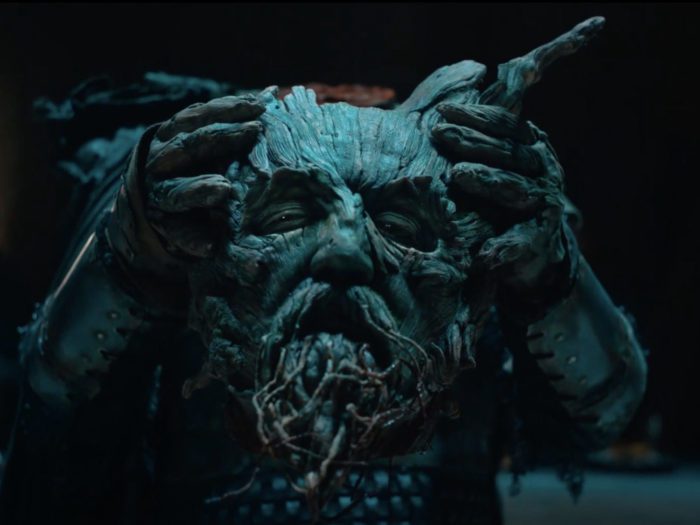
When The Green Knight begins, Gawain seems like the Arthurian version of a spoiled rich kid. He’s woken up in a brothel by his apparent girlfriend, a young woman named Essel, and when he gets home, his mother tells him he smells like alcohol. To be fair, we don’t really know what Gawain does besides hang out at this place and party, but other than the feast where the titular Green Knight appears, we don’t see him do much else before he sets off on his quest to find the creature again. So even though the movie never explicitly ties this all together for us, the implication is pretty clear. Gawain only cares about having fun, and he doesn’t take much responsibility for himself.
In other words, while he may be a fun guy to hang out with, he’s not a very good person. Sure, there’s nothing wrong with partying and having fun, but they shouldn’t take up all our time. We also have to use our talents and abilities to be productive members of society and make the world a better place (even if only slightly), but as far as we can tell, Gawain does nothing of the sort. He’s just a selfish man-child who lives entirely for himself, and the rest of the story is all about his transformation into a real man of virtue and integrity.
Although this change doesn’t occur until the very last scene, Gawain’s journey to become a good person begins when he attends a feast held by his uncle, King Arthur. While there, Arthur and his wife Guinevere invite him to sit with them, and they ask him to tell them a story about his life. Gawain says he doesn’t have any, but Guinevere responds with confidence that he will one day. After that brief exchange, Arthur stands up and asks if anybody else in attendance can tell him a great story about themselves, but before anyone can answer, the Green Knight bursts into the banquet hall and proposes a challenge to all the knights in the room.
He challenges any one of them to try to strike a blow against him, and if they succeed, they’ll have to travel to the Green Chapel in exactly one year and receive the exact same blow in return from him. Gawain bravely accepts, but instead of giving the Green Knight a small cut, he foolishly beheads the creature, saying, “Never forget what happened here.”
The movie doesn’t tell us why he does this, but once again, the implication is pretty clear. He’s in a room full of legendary knights who can recount great tales of their heroic exploits, so he’s embarrassed that he doesn’t have a single story to tell about himself. He wants to be great like them, and that desire leads him to forget his better judgment and try to create a story right then and there. He wants to do more than just languish in the mediocrity that’s characterized his life up to then, so he chops the Green Knight’s head off to show everyone how brave and formidable he is.
Now, this is a stupid decision, but at least Gawain’s heart is in the right place…kind of. He recognizes that he needs to change, but he goes about it the wrong way. What he really needs is to take responsibility for himself and become a good person, but he reaches for fame and glory instead. He thinks he’s going to become a celebrated knight for slaying this supernatural monster, but to his surprise, the Green Knight just stands back up, picks his head up off the ground, and rides out, leaving Gawain with a dilemma. He can hold up his end of the bargain and courageously let the Green Knight return the blow a year later, or he can just continue his carefree life and back out of the deal like a coward.
Gawain’s First Two Tests
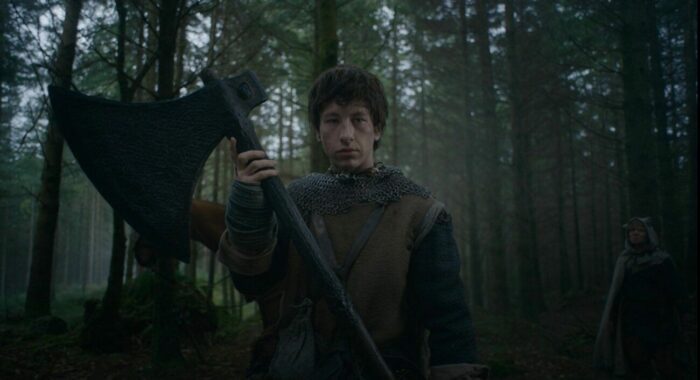
Neither option seems all that enticing, but when the time comes, Gawain ultimately makes the right choice and rides out to meet the Green Knight. However, he doesn’t do it for the right reasons. As he tells Essel when she pleads with him not to go, this is how people become great, so he’s not doing it because he’s a man who keeps his word and accepts the consequences of his actions. Rather, he’s doing it because he’s still trying to become a famous knight with a legendary tale to tell, and his journey to the Green Chapel bears this out pretty clearly.
Now, a lot of really interesting and perplexing stuff happens to Gawain on this journey, and like I said before, it’s tough to figure out what every individual scene means, but the main point of it is pretty clear. At its core, this is a series of five trials that test his moral integrity, and up until the very end, he fails each one of them.
First, he comes across a boy scavenging in a battlefield littered with dead soldiers, and when the boy gives him some directions to the Green Chapel, Gawain thanks him and starts to ride away. In response, the boy asks for some recompense for his help, but Gawain refuses. The boy asks again and says that a knight like him “could spare a wretch like me just a small, small act of kindness,” and only then does Gawain finally give in and flip the kid a coin.
Next, Gawain meets a girl named Winifred who says she’s lost her head and needs help finding it again, but when the girl leads him to the spring where her head lies, he doesn’t help her right away. Instead, he asks what’s in it for him, and Winifred angrily responds, “Why would you ask me that? Why would you ever ask me that?” So again, only after being rebuked for his selfishness does Gawain finally jump into the spring and find the girl’s head for her.
To be fair, Gawain doesn’t entirely fail these tests, but he doesn’t exactly pass them either. Sure, he does help both people eventually, but he doesn’t do it out of the goodness of his heart. He’s just guilted into it, and while that’s better than not helping them at all, it shows without a doubt that he’s not a genuinely good person yet.
Instead, he still has the same mindset he had when he accepted the Green Knight’s challenge a year ago. He just wants to become a famous hero and be the subject of legendary tales like King Arthur’s knights, but that’s the wrong attitude to have. What really matters is his moral integrity, and as these tests show, he’s entirely lacking in that regard. He’s still the same selfish man-child he was before, so even though he’s undertaken this dangerous quest, he hasn’t truly risen above the mediocrity that held him down before the Green Knight appeared.
The Lord’s House
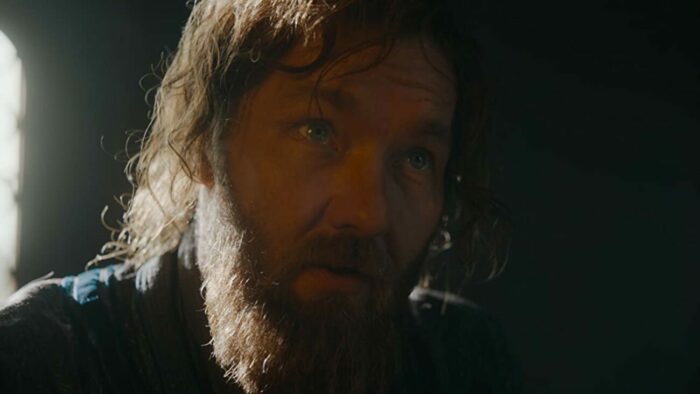
Gawain’s next two tests both come when he meets a mysterious man known only as the Lord (as in “the lord of the house,” not God) and stays at his home for a short time. While there, the Lord says he’s going to go hunting, and he makes a deal with Gawain. He’ll give Gawain the best thing he catches, and in return, Gawain will give him whatever he receives during his stay in the man’s home. Gawain agrees, but as you can probably guess, things don’t go quite that smoothly.
However, before the time comes to make good on his word, Gawain faces his third test. The Lord’s wife makes sexual advances toward him, and since she’s a married woman and he seems to have a girlfriend, he should obviously resist her. But unsurprisingly, he doesn’t. He just lets the woman do whatever she wants to him, so he fails this test even worse than the first two. He straight up commits adultery with the Lord’s wife and cheats on his girlfriend without giving an ounce of resistance, so once again, it’s obvious that Gawain still lacks any sort of moral integrity.
Right after that, the woman gives him a green girdle and says it’ll keep him safe from harm when he wears it, so according to the deal Gawain made earlier, he should give it to the Lord. But again, he doesn’t. Instead, Gawain immediately runs out of the house and gets back on the road to the Green Chapel, so he clearly has no intention of honoring their deal.
But on his way there, he runs into the Lord, and the man gives Gawain a fox he caught during his hunt. In return, he asks Gawain to hold up his end of the bargain, but Gawain refuses. He says he doesn’t have anything to give, and then he goes off to find the Green Knight. So again, he totally fails the test. He lies and goes back on his word, showing once more that he has no moral integrity whatsoever.
Facing the Green Knight
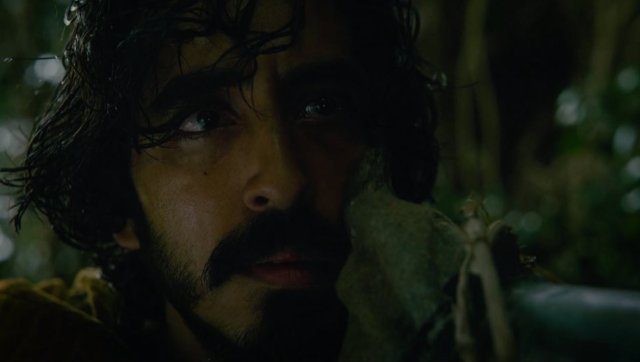
When Gawain finally arrives at the Green Chapel after failing his first four tests, he still has one more to go. He has to face the Green Knight, and he has a decision to make. In fact, it’s the same decision he faced before he set off on his journey: Does he keep his word and accept the consequences of his actions the previous year, or does he run away at the last minute and just tell everyone he defeated the Green Knight in battle?
Given how poorly Gawain fared in his previous tests, it’s easy to think he’s going to choose the latter route, and at first, it appears that he does. When the Green Knight lifts his ax to deliver his blow, Gawain flinches, and he imagines himself running away and living out the rest of his days as a fraud.
In this imaginary version of his life, he becomes king after Arthur’s death; he has a baby with Essel but then leaves her to marry a noblewoman, and after his son is killed and his kingdom falls, he ends it all by removing his protective green girdle and letting himself finally die. It’s a really sad sequence of events, and you can tell from Gawain’s body language and the look on his face that he’s unhappy pretty much the entire time.
This vision shows him where a life without moral integrity would ultimately lead, and it’s not pretty. Sure, it starts out full of external honor and respectability, but that doesn’t make him happy. Instead, it just leads him down a spiral of depression, so he remains completely unfulfilled to his dying breath.
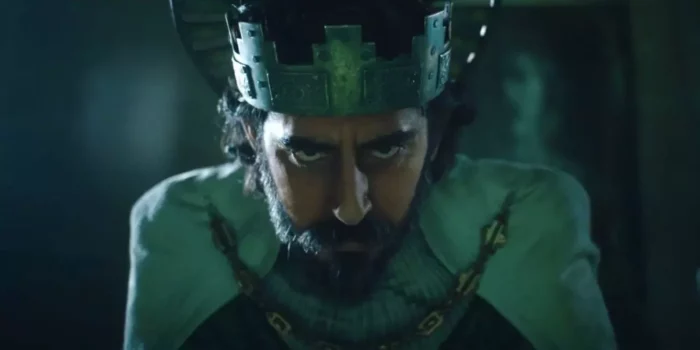
On top of that, this vision also shows how fragile outward honor and respectability are. Despite Gawain’s promising beginning as king, it all falls apart for him in the end, and his legacy becomes worthless. He dies in disgrace, and all the accolades people probably heaped on him for surviving the Green Knight ultimately mean nothing.
So not only does he end up unhappy for the rest of his life, but his legacy fails him as well, and the way I see it, that really seals the deal for us. It shows that no matter what else we have, even if it’s an entire kingdom, we’ll remain forever unfulfilled if we’re bad people. Sure, other things might make us happy for a little while, but that happiness is too fragile to last. It’ll inevitably fade sooner or later, so the only thing that can truly give us peace and fulfill us is living a life of moral integrity.
Gawain realizes all this, so after his imaginary vision is over, he decides to accept his fate. He takes off his protective girdle and tells the Green Knight he’s ready, and with that choice, he finally shows some moral integrity. He takes responsibility for what he did the year before, and he accepts the consequences of his brash conduct at Arthur’s feast.
In response, the Green Knight acknowledges Gawain’s newfound integrity and praises him for it, saying, “Well done, my brave knight. Now, off with your head.” The film ends right there, so we don’t actually see the Knight kill Gawain, but it’s pretty heavily implied. The Green Knight holds up his end of the bargain, and in the final moment of Gawain’s life, the man finally gains the moral integrity that eluded him up until then.




I like to think that Gawain doesn’t get decapitated in the end. “Off with your head” could also mean that that he is free to leave, with his head on. He has finally become the brave knight of virtue and integrity, holds up his end of the bargain, removes the green girdle and accepts death without flinching. His lesson is learnt. In the 14th poem, Gawain does go home with great tales to share, bearing just a scar on his neck …